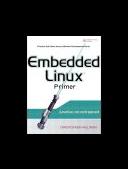
Comprehensive Real-World Guidance for Every Embedded Developer and Engineer
This book brings together indispensable knowledge for building efficient, high-value, Linux-based embedded products: information that has never been assembled in one place before. Drawing on years of experience as an embedded Linux consultant and field application engineer, Christopher Hallinan offers solutions for the specific technical issues you're most likely to face, demonstrates how to build an effective embedded Linux environment, and shows how to use it as productively as possible.
Hallinan begins by touring a typical Linux-based embedded system, introducing key concepts and components, and calling attention to differences between Linux and traditional embedded environments. Writing from the embedded developer's viewpoint, he thoroughly addresses issues ranging from kernel building and initialization to bootloaders, device drivers to file systems.
Hallinan thoroughly covers the increasingly popular BusyBox utilities; presents a step-by-step walkthrough of porting Linux to custom boards; and introduces real-time configuration via CONFIG_RT--one of today's most exciting developments in embedded Linux. You'll find especially detailed coverage of using development tools to analyze and debug embedded systems--including the art of kernel debugging.
• Compare leading embedded Linux processors
• Understand the details of the Linux kernel initialization process
• Learn about the special role of bootloaders in embedded Linux systems, with specific emphasis on U-Boot
• Use embedded Linux file systems, including JFFS2--with detailed guidelines for building Flash-resident file system images
• Understand the Memory Technology Devices subsystem for flash (and other) memory devices
• Master gdb, KGDB, and hardware JTAG debugging
• Learn many tips and techniques for debugging within the Linux kernel
• Maximize your productivity in cross-development environments
• Prepare your entire development environment, including TFTP, DHCP, and NFS target servers
• Configure, build, and initialize BusyBox to support your unique requirements
13.6.4. ldd
13.6.4. ldd
Although not strictly a binary utility, the ldd script is another useful tool for the embedded developer. It is part of the C library package and exists on virtually every Linux distribution. ldd lists the shared object library dependencies for a given object file or files. We introduced ldd in Chapter 11, "BusyBox." See Listing 11-2 for an example usage. The ldd script is particularly useful during development of ramdisk images. One of the most common failures asked about on the various embedded Linux mailing lists is a kernel panic after mounting root:
VFS: Mounted root (nfs filesystem).
Freeing unused kernel memory: 96k init
Kernel panic - not syncing: No init found. Try passing init=option to kernel.
One of the most common causes is that the root file system image (be it ramdisk, Flash, or NFS root file system) does not have the supporting libraries for the binaries that the kernel is trying to execute. Using ldd, you can determine which libraries each of your binaries requires and make sure that you include them in your ramdisk or other root file system image. In the previous example kernel panic, init was indeed on the file system, but the Linux dynamic loader, ld.so.1, was missing. Using ldd is quite straightforward:
$ xscale_be-ldd init
libc.so.6 => /opt/mvl/.../lib/libc.so.6 (0xdead1000)
ld-linux.so.3 => /opt/mvl/.../lib/ld-linux.so.3 (0xdead2000)
This simple example demonstrates that the init binary requires two dynamic library objects: libc and ld-linux. Both must be on your target and must be accessible to your init binary that is, they must be readable and executable.




